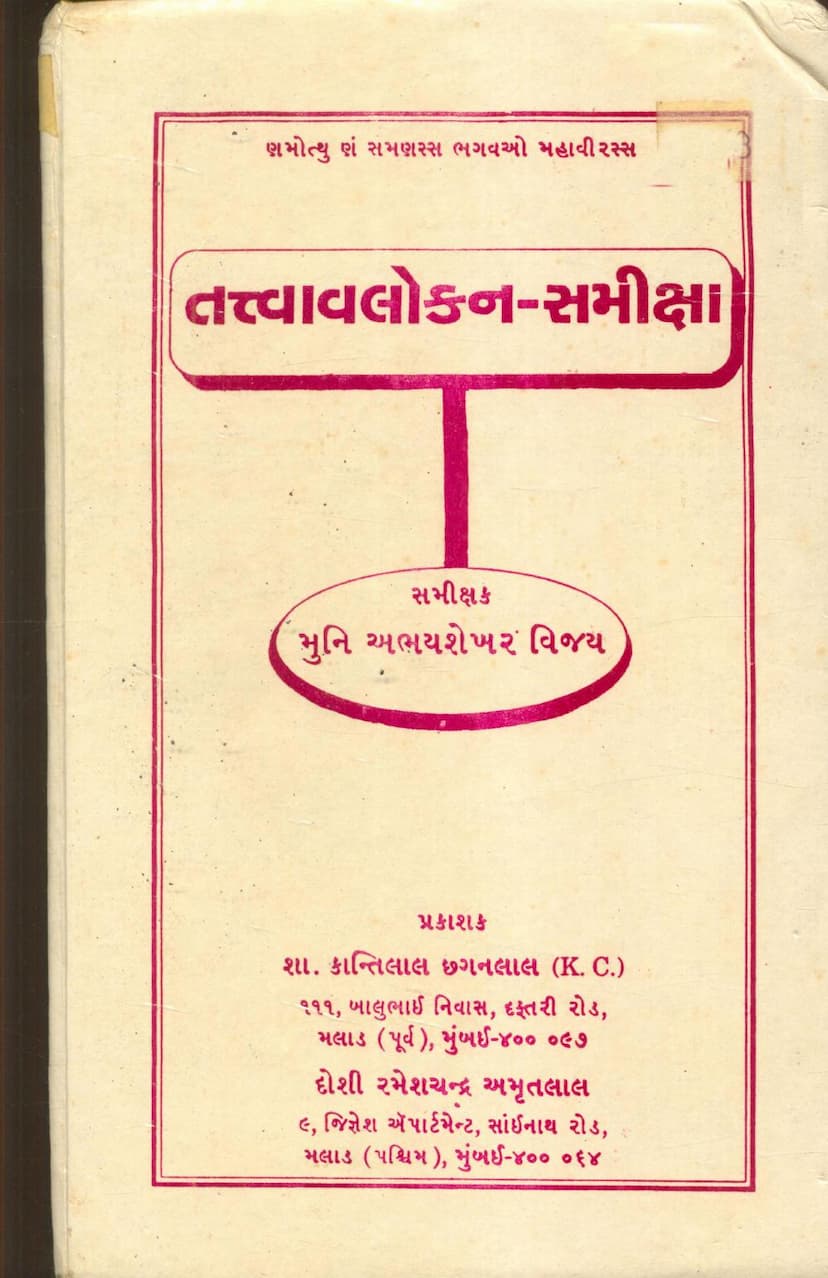Tattvavalokan Samiksha
Added to library: September 2, 2025

Summary
This document is a critical review and commentary on the Jain text titled "Tatvāvlokan Samiksha" by Muni Abhayshekharsuri. Published by Kantilal Chhaganlal, it is intended for private and personal use only. The book is a detailed examination and critique of the "Tatvāvlokan" authored by Muni Kirtyashvijayji, which itself was a preface to Muni Ramchandrasurishwarji's book "Dharma Swaroop Darshan."
The review highlights a significant doctrinal dispute that arose between two prominent disciples of Acharya Shrimad Vijayprem Surishwarji: Acharya Shrimad Vijayramchandrasurishwarji and Acharya Shrimad Vijaybhuvanbhanu Surishwarji. This dispute, initially concerning the interpretation of the "Ishtfal Siddhi" pada in the Shri Jayvirayarasutra, led to considerable scholarly exchange. Ultimately, a reconciliation was reached, and a guiding circular signed by both revered figures was issued, bringing a peaceful resolution to the contentious issue within the Jain community.
The publication of this review, "Tatvāvlokan Samiksha," four years after the reconciliation, is explained by the re-emergence of the same subject matter. In 2047 V.S., Muni Nayavardhanvijayji, during a discourse, presented several statements that deviated from scriptural consensus and the reconciliation pact. These included assertions like:
- One who does not desire moksha (liberation) has no right to even ascend the steps of a temple.
- Any ritual performed without the intention of moksha is worthless, equivalent to a broken almond.
Acharya Shrimad Vijaybhuvanbhanu Surishwarji, upon learning of these "Jinvachan-nirpeksh" (independent of Jina's word) pronouncements, expressed his deep displeasure. He requested a written clarification from Muni Nayavardhanvijayji. Although a written response was not received, a two-hour personal discussion took place where Muni Nayavardhanvijayji's views were countered with scriptural evidence, logic, and reasoning by learned monks, including a presentation of the reconciliation circular.
Despite the resolution, the issue resurfaced through continued discussions and writings in publications like "Jain Shasan," which perpetuated "shastranirpeksh" (scripture-independent) views, potentially misleading less knowledgeable and impressionable individuals. This necessitates the publication of "Tatvāvlokan Samiksha" to present the truth neutrally and logically, allowing all to understand the correct scriptural interpretation and the agreed-upon reconciliation.
The reviewer, Muni Abhayshekh Vijayji, meticulously analyzes and refutes many of the "shastra-viprit" (contrary to scripture) arguments presented in Muni Kirtyashvijayji's "Tatvāvlokan." He uses scriptural citations, logic, and reasoning to demonstrate the inconsistencies in the reinterpretations of sacred texts. The review aims to help neutral and virtuous individuals understand the truth, and it is recommended for anyone seeking to grasp the correct meaning of scriptures and discern flaws in erroneous interpretations.
The book also emphasizes the importance of understanding the nuances of Jain scriptures, which often use words with multiple meanings depending on the context and perspective. It cautions against misinterpreting specific pronouncements as universal truths and highlights the necessity of relying on established scriptural interpretations and the consensus of learned scholars. The reviewer's intention is not to defeat any party but to clarify the truth based on scripture and reason, thereby benefiting the entire Jain community.
The appendix of the book lists various points of contention and their detailed analysis, including:
- The secret meaning of the "Vishay-Suh" shloka.
- The blessing given to King Kumarpal.
- The meaning of the story of Manorama.
- The principle that an example is not a doctrine.
- The account of the burning of Dwarka.
- The story ofanamika's vow.
- The interpretation of the "Lajja Tto Bhaya Tto" shloka.
- Which kind of Dharma yields auspicious results.
- The duty to practice Dharma even for those desiring worldly pleasures.
- The secret of Tap Panchashak.
- The specialty of the word "Visao."
- Considerations of consistency in practice.
- The implied meaning of "Dhanarthina."
- The contemplation of Kathakathan.
- The four human pursuits.
The entire review is presented with respect towards the revered spiritual leaders involved and with the ultimate goal of upholding the true teachings of Jainism.